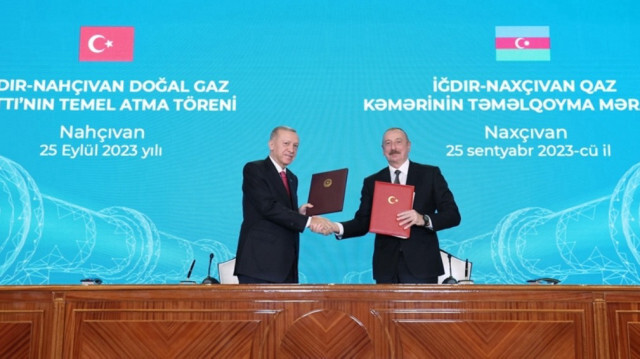Igdir-Nakhchivan gas pipeline holds great significance for Türkiye’s current energy profile: Expert | Politics
The newly inaugurated Igdir-Nakhchivan natural gas pipeline holds great significance for Türkiye’s current energy profile, given the country’s heavy reliance on energy imports, according to a Turkish expert.
The groundbreaking ceremony of the pipeline, which will run from Türkiye’s eastern province of Igdir to Sederek in western Azerbaijan, was held on Sept. 25 and attended by President Recep Tayyip Erdogan and his Azerbaijani counterpart Ilham Aliyev.
Speaking to Anadolu, Deniz Istikbal, an economy researcher at the Foundation for Political, Economic, and Social Research (SETA), said such projects offer benefits for both nations, not only in the energy sector but also foreign trade and various other economic fields.
“Additionally, this energy line enables Türkiye to play a role in reducing Azerbaijan’s dependence on Russia and other neighboring countries,” he said.
Istikbal emphasized the potential for increased cooperation between Azerbaijan and Türkiye, particularly in the energy sector.
Currently, Iran is the biggest natural gas supplier to Nakhchivan.
In December 2020, Türkiye and Azerbaijan signed a memorandum of understanding for gas supply aimed at slashing Nakhchivan’s dependence on Iran to zero.
Under the pact, this 85-kilometer (53-mile) pipeline was built to Nakhchivan as a continuation of the Igdir Natural Gas Pipeline, which exits via the Eastern Anatolia Natural Gas Main Transmission Line.
The pipeline has an annual transport capacity of 500 million cubic meters, enough to meet all of Nakhchivan’s natural gas needs.
The construction is expected to be completed by the end of 2024.
According to the 2023 Annual Investment Program released in January, Türkiye is slated to invest 568 million Turkish liras (over $20 million) in the joint project over the 2020-2024 period.
This project will be the third natural gas pipeline collaboration between Türkiye and Azerbaijan, following strategic investments like the South Caucasus Pipeline, also known as Baku-Tbilisi-Erzurum Pipeline, and the Trans-Anatolian Natural Gas Pipeline Project.
The project will be executed through a partnership between Türkiye’s crude oil and natural gas pipeline trading company BOTAS and Azerbaijan’s state oil company SOCAR.
– Boost for Azerbaijan’s geopolitical independence
Nakhchivan has Azerbaijan’s only land border with Türkiye, measuring 17.7 kilometers (11 miles), and serves as the gateway from Türkiye to the Turkic world.
Nakhchivan has been an important transition and connection point between east and west, north and south due to its geographical location throughout history.
Azerbaijan’s overall investments in Türkiye stand at nearly $19 billion, while Türkiye has $12 billion worth of investments in Azerbaijan, according to Istikbal.
“Both countries have signed numerous agreements aimed at further expanding these investments. The inauguration of the natural gas pipeline last month stands out as one of the most important steps taken in this direction,” he said.
As Azerbaijan becomes more economically integrated with Türkiye, Russia’s influence in Baku is expected to wane, he said.
“This move will bolster the independence of Azerbaijan in the broader geopolitical landscape,” he said.
Türkiye is also keen on energy cooperation with other members of the Organization of Turkic States, Istikbal added, referring to the regional bloc comprising Türkiye, Azerbaijan, Kazakhstan, Kyrgyzstan and Uzbekistan.
“These nations possess abundant energy resources, while Türkiye boasts a well-developed manufacturing industry and a skilled workforce,” he said.
He said these initiatives will also contribute to “Türkiye’s ongoing efforts to diversify its energy supply security.”



